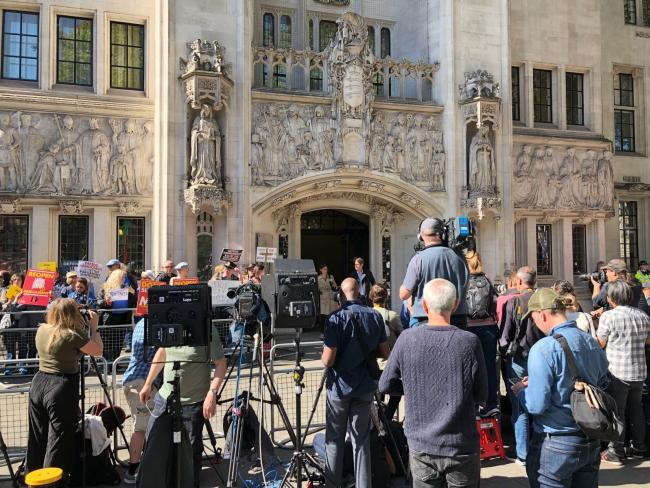26 August 2024

Journalists outside the Supreme Court in September 2019 after one of the many hearings over leaving the EU. Photo Steve Nimmons via Wikimedia Commons (CC BY 2.0).
The future of oil and gas production in Britain is threatened by a court decision in June. The incoming Labour government has already used this decision to justify its actions on energy and mining, a risk to the country’s energy security and industry.
Courts have ruled that oil and gas exploration permits must take account of the future emissions of what is extracted – a reversal of the previous understanding.
Objectors
The new government has already used this ruling to settle legal actions in favour of objectors. It is also sticking to its manifesto policy ending new North Sea exploration.
At the end of June, the Supreme Court ruled that future emissions should have been taken into account when considering the expansion of Horse Hill oil well in Surrey. It said the council failed to do so and the permission it gave was unlawful.
Willingness
This case is the culmination of a five year campaign by environmental activists, supported by Friends of the Earth and Greenpeace. Hailed as a landmark victory by opponents of oil exploration, it stands rather as a testament to the willingness of the judicial system to enforce environmental targets.
The court decision is a legalistic judgement, not a scientific one. Predictably, UK Oil & Gas plc, the company owning the well, has announced it will now aim for reduced production.
‘The decision casts doubt on new mining and drilling projects.’
Although two of the five judges disagreed, the decision casts doubt on new mining and drilling projects. It will give fresh hope to those who seek to limit North Sea production, or even close it down.
And the new communities secretary, Angela Rayner, has wasted no time pre-empting other legal decisions. Her department has conceded that the Surrey decision also applied to another disputed development at Biscathorpe in Lincolnshire, which renders a pending judgement irrelevant.
Challenges
And before a court hearing set for 16 July to hear legal challenges to the development of Woodhouse Colliery in Cumbria, Rayner has said that the same decision means the approval by the previous government was wrong in law.
The mine’s developers, West Cumbria Mining, are continuing with their defence, but it will be undermined by the government actions. The court decision is awaited.
Rayner has not suggested that the cases in dispute be re-evaluated – which would be particularly important for the Cumbria mine aimed at producing coal for steelmaking.
Edicts
Significantly, the Supreme Court must take into account edicts from the European Court of Human Rights (ECHR) when making its rulings.
And it may make a declaration, even on primary legislation, when it considers such legislation incompatible with international obligations, particularly to the ECHR.
Interference
And that’s not just a theoretical issue. In April the EHCR found in favour of Swiss environmental campaigners in a case against their government, ordering it to reduce emissions. In June, the Swiss parliament rejected the ruling as an unprecedented and unnecessary interference in their affairs.
The ECHR is a creation of the Council of Europe and not the EU, but there has always been a close relationship. This will be strongly reinforced by the expected accession of the EU to the European Convention on Human Rights.
The British government’s Political Declaration on leaving the EU committed it to remain within the ECHR. In other words, the tentacles of the EU continue to probe deep into the British legal system.
